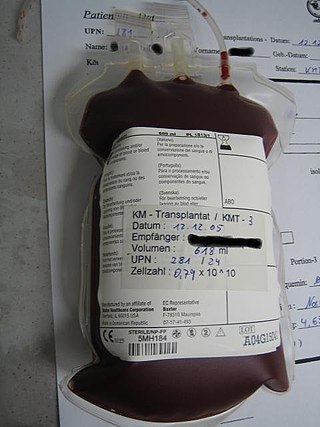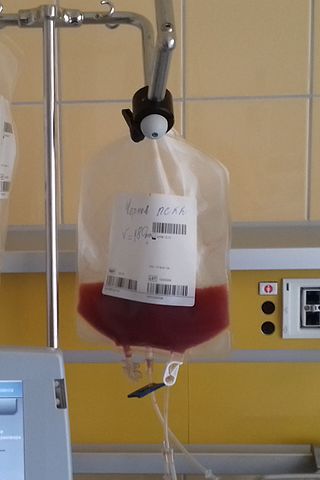Related Research Articles

Leukemia is a group of blood cancers that usually begin in the bone marrow and result in high numbers of abnormal blood cells. These blood cells are not fully developed and are called blasts or leukemia cells. Symptoms may include bleeding and bruising, bone pain, fatigue, fever, and an increased risk of infections. These symptoms occur due to a lack of normal blood cells. Diagnosis is typically made by blood tests or bone marrow biopsy.
Aplastic anemia (AA) is a severe hematologic condition in which the body fails to make blood cells in sufficient numbers. Aplastic anemia is associated with cancer and various cancer syndromes. Blood cells are produced in the bone marrow by stem cells that reside there. Aplastic anemia causes a deficiency of all blood cell types: red blood cells, white blood cells, and platelets.

Bone marrow is a semi-solid tissue found within the spongy portions of bones. In birds and mammals, bone marrow is the primary site of new blood cell production. It is composed of hematopoietic cells, marrow adipose tissue, and supportive stromal cells. In adult humans, bone marrow is primarily located in the ribs, vertebrae, sternum, and bones of the pelvis. Bone marrow comprises approximately 5% of total body mass in healthy adult humans, such that a man weighing 73 kg (161 lbs) will have around 3.7 kg (8 lbs) of bone marrow.

Hematopoietic stem-cell transplantation (HSCT) is the transplantation of multipotent hematopoietic stem cells, usually derived from bone marrow, peripheral blood, or umbilical cord blood, in order to replicate inside a patient and produce additional normal blood cells. HSCT may be autologous, syngeneic, or allogeneic.

Graft-versus-host disease (GvHD) is a syndrome, characterized by inflammation in different organs. GvHD is commonly associated with bone marrow transplants and stem cell transplants.

Anthony Nolan is a UK charity that works in the areas of leukaemia and hematopoietic stem cell transplantation. It manages and recruits donors to the Anthony Nolan Register, which is part of an aligned registry that also includes the Welsh Bone Marrow Donor Registry, NHS Blood and Transplant's British Bone Marrow Registry and Deutsche KnochenMarkSpenderdatei (DKMS) UK. This aligned register is known as the Anthony Nolan & NHS Stem Cell Registry. It also carries out research to help make bone marrow transplants more effective.

Cell therapy is a therapy in which viable cells are injected, grafted or implanted into a patient in order to effectuate a medicinal effect, for example, by transplanting T-cells capable of fighting cancer cells via cell-mediated immunity in the course of immunotherapy, or grafting stem cells to regenerate diseased tissues.

Acute myeloid leukemia (AML) is a cancer of the myeloid line of blood cells, characterized by the rapid growth of abnormal cells that build up in the bone marrow and blood and interfere with normal blood cell production. Symptoms may include feeling tired, shortness of breath, easy bruising and bleeding, and increased risk of infection. Occasionally, spread may occur to the brain, skin, or gums. As an acute leukemia, AML progresses rapidly, and is typically fatal within weeks or months if left untreated.
The National Marrow Donor Program (NMDP) is a nonprofit organization founded in 1987 and based in Minneapolis, Minnesota, that operates the Be The Match Registry of volunteer hematopoietic cell donors and umbilical cord blood units in the United States.
Juvenile myelomonocytic leukemia (JMML) is a rare form of chronic leukemia that affects children, commonly those aged four and younger. The name JMML now encompasses all diagnoses formerly referred to as juvenile chronic myeloid leukemia (JCML), chronic myelomonocytic leukemia of infancy, and infantile monosomy 7 syndrome. The average age of patients at diagnosis is two (2) years old. The World Health Organization has included JMML as a subcategory of myelodysplastic and myeloproliferative disorders.
Autologous stem-cell transplantation is the autologous transplantation of stem cells—that is, transplantation in which stem cells are removed from a person, stored, and later given back to that same person.

Treosulfan, sold under the brand name Trecondi, is a medication given to people before they have a bone marrow transplant from a donor known as allogeneic hematopoietic stem cell transplantation. It is used as a 'conditioning' treatment to clear the bone marrow and make room for the transplanted bone marrow cells, which can then produce healthy blood cells. It is used together with another medicine called fludarabine in adults and children from one month of age with blood cancers as well as in adults with other severe disorders requiring a bone marrow transplant.

Peripheral blood stem cell transplantation (PBSCT), also called "Peripheral stem cell support", is a method of replacing blood-forming stem cells. Stem cells can be destroyed through cancer treatments such as chemotherapy or radiation, as well as any blood-related diseases, such as leukemia, lymphoma, neuroblastoma and multiple myeloma. PBSCT is now a much more common procedure than its bone marrow harvest equivalent due to the ease and less invasive nature of the procedure. Studies suggest that PBSCT has a better outcome in terms of the number of hematopoietic stem cell yield.
Transplantable organs and tissues may refer to both organs and tissues that are relatively often transplanted, as well as organs and tissues which are relatively seldom transplanted. In addition to this it may also refer to possible-transplants which are still in the experimental stage.

The Gift of Life Marrow Registry is a non-profit organization founded in 1991 and headquartered in Boca Raton, Florida that operates a public blood stem cell and bone marrow registry while facilitating transplants for children and adults battling life-threatening illnesses, including leukemia, lymphoma, other cancers and genetic diseases.

Childhood leukemia is leukemia that occurs in a child and is a type of childhood cancer. Childhood leukemia is the most common childhood cancer, accounting for 29% of cancers in children aged 0–14 in 2018. There are multiple forms of leukemia that occur in children, the most common being acute lymphoblastic leukemia (ALL) followed by acute myeloid leukemia (AML). Survival rates vary depending on the type of leukemia, but may be as high as 90% in ALL.
Bone marrow failure occurs in individuals who produce an insufficient amount of red blood cells, white blood cells or platelets. Red blood cells transport oxygen to be distributed throughout the body's tissue. White blood cells fight off infections that enter the body. Bone marrow also contains platelets, which trigger clotting, and thus help stop the blood flow when a wound occurs.
Deutsche Knochenmarkspenderdatei, abbreviated as DKMS, is an international nonprofit bone marrow donor center based in Tübingen, Germany, with entities in Chile, India, Poland, South Africa, the United Kingdom and the United States. DKMS works in the areas of blood cancer and hematopoietic stem cell transplantation and raises awareness of the need for donors for hematopoietic stem cell transplantation which people with blood cancers need for treatment as well as helping people sign up to their national bone marrow registries. Over the years, DKMS has expanded beyond Germany.

DATRI is a not-for-profit organization registered in 2009 as a Section 8 company under Government of India. DATRI is one of the largest unrelated blood stem cell donors registry in India, that helps patients with blood cancer and other fatal blood disorders to find a HLA matched Blood Stem Cell donor. Blood stem cell transplant is a chance of cure for patients with blood cancer and other severe blood disorders. As of January 2023, DATRI has more than 5 lakhs voluntary donors registered and it has facilitated 1074 plus transplants worldwide. DATRI operates across India.

Shimon Slavin is an Israeli professor of medicine. Slavin pioneered the use of immunotherapy mediated by allogeneic donor lymphocytes and innovative methods for stem cell transplantation for the cure of hematological malignancies and solid tumors, and using hematopoietic stem cells for induction of transplantation tolerance to bone marrow and donor allografts.
References
- ↑ "Our story". ACLT. Retrieved 4 February 2023.
- ↑ "Biography". Tim Campbell. Archived from the original on 13 October 2018. Retrieved 3 October 2018.
Tim is also a great supporter of the Jack Petchey Foundation, the ACLT...
- ↑ "ACLT Charity Patron – David 'The Hayemaker' Haye". ACLT. November 2009. Archived from the original on 9 February 2010. Retrieved 9 April 2015.
- ↑ Truman, Peter (9 October 2008). "Leukaemia campaigner Daniel De Gale dies". Croydon Guardian . Retrieved 3 October 2018.
- ↑ "Donor campaigner's funeral held". BBC News. 24 October 2008. Retrieved 3 October 2018.
- ↑ "Video: Bone marrow and organ donor appeal Leeds". ITV . 22 September 2012. Retrieved 1 August 2014.
- 1 2 Bingham, John (11 June 2011). "Honours: OBE for campaigning mother driven by son's leukaemia tragedy". The Daily Telegraph. London. Retrieved 3 October 2018.
- 1 2 "Bone marrow campaigner honoured". BBC News. Retrieved 3 October 2018.
- ↑ "We Think Croydon's champion gala reception". Western Telegraph . 14 November 2002. Retrieved 3 October 2018.
- ↑ Rudd, Andy (7 October 2014). "Pride of Britain roll of honour: All the winners and all their heroic acts". Daily Mirror. Retrieved 3 October 2018.
- ↑ "Croydon groups scoop prizes at Heart of the Community awards". The Croydon Advertiser . 11 June 2009. Archived from the original on 2 April 2015. Retrieved 3 October 2018.
- ↑ "2012 MSVA (Music Video & Screen Awards)". Diva Scribe. Retrieved 3 October 2018.
- ↑ "Oliver Memorial Award Winners 2013 – African Caribbean Leukaemia Trust" (PDF). Royal College of Pathologists . 9 December 2013. Archived from the original (PDF) on 2 April 2015. Retrieved 25 March 2015.
- ↑ "African Caribbean Leukaemia Trust: Community Organisation Award for Race, Religion & Faith". National Diversity Awards . Archived from the original on 2 April 2015. Retrieved 25 March 2015.
- ↑ Gbadamosi, Nosmot; Paton, Nic (6 November 2014). "HSJ BME Pioneers 2014". Health Service Journal . Retrieved 3 October 2018.
- ↑ "National BME Cancer Alliance" (PDF). Irish in Britain. Retrieved 3 October 2018.
- ↑ "ACLT". National BAME Transplant Alliance. 8 October 2016. Retrieved 3 October 2018.
- ↑ "Cancer Equalities". National Cancer Intelligence Network . Retrieved 3 October 2018.
- ↑ "B04. Specialised Cancer Diagnostics". NHS England . Retrieved 3 October 2018.